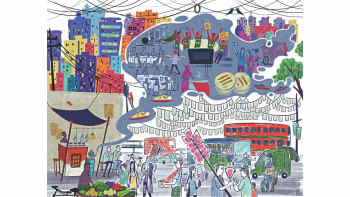Why we think romantic love is unimportant

I love love. I always have. But I haven't always been so comfortable announcing this fact publicly.
Don't misunderstand me, though. I am better than the common rube who also glorifies Valentine's Day. I know this occasion has nothing to do with love and everything to do with companies exploiting the most vulnerable emotions of their consumers to count higher profits. That said, I still get giddy seeing how people around me celebrate (or at least acknowledge) this day. Their online displays of affection, getting dressed up in the day's colours, the flower children in traffic who double down on guilt-tripping men to buy a rose or few for the woman next to them; all of this gives me unadulterated joy. During Valentine's week, love is everywhere. And I beam for what the cynics loathe. But why is there so much resistance against celebrating love – specifically romantic love?
Well, as much as the romcoms of our childhood have tried to convince us of the mightiness and indestructibility of love, our adult selves have discovered the reality to be otherwise. Love turned out to be insincere at times, fragile often, and always, always so complicated. In even the most fulfilling relationships, exhaustion (as a result of conflict) sets in eventually.
The worst case scenario is one or both partners realising they have reached a dead-end. What began as warm feelings of affection and reassurance leaves behind resentment, hopelessness, bitterness. We may try again, with someone else. But every "failed" relationship also hardens our views on romantic love, until some of us only resort to it half-heartedly as something that needs to be done. A part of life as anything else is.
It doesn't help that, either guided by religion or dominant social norms, we are discouraged from seeking romantic love, let alone valuing it. Instead, we learn to place more importance on the other crucial relationships of our lives: friendships, parenthood, and the love we share with our family members.
Needless to say, it is important that we not attach more value to any one of our relationships arbitrarily. But it is unfortunate that most people experiencing one failed romantic relationship tend to give up on love altogether. In the process, we also normalise giving less to our current partner. We cut back on the gifts, on the overt affection, and on anything that could make us appear vulnerable to the person who intends to hold our hand through the remaining decades of our lives. We equate not being romantic with being realistic and mature.
Granted, some people are intrinsically less inclined towards being romantic than others. But the battered lovers who view romance as an indulgence – almost a luxury – are, quite pitiably, missing out on some of the most accessible and candid joys that our nauseatingly capitalistic world has to offer.
There's even a nifty old theory that attempts to explain a) why a wedding ring is worn on the fourth finger and b) why romantic love may be more important than the other kinds of love in one's life.
To start, put together the fingertips of both your hands and bend only the middle fingers towards each other, connecting them at the second and third joints. The middle finger represents yourself, the thumbs are your parents, the index fingers your siblings, the third finger your partner (surprise, surprise), and the smallest fingers represent your children. Essentially, you can keep your middle fingers connected while moving the rest of the fingers away from each other. All except the fingers representing your partner. When you try to move those away from each other (or break that connection, more fittingly), the fingers which represent you will buckle, too.
The idea is simply that most other relations in your life will eventually part ways with you, embarking on journeys of their own. Only your partner will be there, the two of you upholding each other through the trials of regular life.
I would blame no cynic for belittling this theory, cheesy as it is. But I do always merit it for recognising that romantic love is on par with all the other kinds of love we experience. Isn't it time we value it as such? Our partners see the worst of us and stay with us throughout it all; be it with their words, affection, a shared meal or laugh.
In the end, all love is tolerance. Your family members are bound to tolerate you, they feel a sort of responsibility to do so. But, more often than not, your romantic partner will choose to be with you and love you through life's many afflictions. Better yet, even when it seems to not be working out, your partner can choose to prioritise your respective futures over the tired notion of a forever love. In the end, all love is an act of letting go – of reservations, resentments, and rigidity.
Afia Jahin is a member of the editorial team at The Daily Star.

 For all latest news, follow The Daily Star's Google News channel.
For all latest news, follow The Daily Star's Google News channel. 












Comments